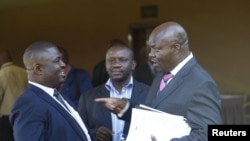GOMA, DEMOCRATIC REPUBLIC OF THE CONGO —
Human rights activists in the Democratic Republic of Congo have called for an immediate halt to the negotiations in Kampala, Uganda, between the DRC government and the M23 rebels. Two of the DRC's leading rights groups say they want a national dialogue to replace the talks.
DRC opposition and community groups have criticized the negotiations since they began last month. They say the talks do not include all segments of the population and that Uganda is not a good place to hold them.
A joint declaration by the DRC rights groups The Voice of the Voiceless and ASADHO (The African Association for the Defense of Human Rights) is another sign that many Congolese think the Kampala talks lack credibility.
These are two highly respected organizations - last year French President Francois Hollande inaugurated a foundation in honor of The Voice of The Voiceless's late president, Floribert Chebeya, whose murder in 2010 is still being investigated.
The Voice of the Voiceless spokesman Rostin Manketa says that since the elections in November 2011, the Congolese have been very divided. He says to cope with the problems that have arisen, including the emergence of the M23 and aggression from neighboring countries, the Congolese need to unite and sit around a table to discuss fundamental issues.
In their declaration, which was issued Thursday, the two organizations called for a national dialogue to be held in DRC. But Manketa said other venues could be considered.
The Voice of the Voiceless and ASADHO also say the M23 militants must lay down their arms and withdraw from all the parts of the country they control. It's important, Manketa says, that no one should gain power in the DRC by violence.
DRC President Joseph Kabila spoke last month about a plan for a national consultation involving the opposition and civil society, aimed at reinforcing national unity.
The government invited opposition and civic groups to the talks in Kampala, but very few such groups are there.
The parties to the Kampala negotiations have so far agreed on an agenda but not much else. This week the international rights organization Human Rights Watch said the talks had made little progress.
DRC opposition and community groups have criticized the negotiations since they began last month. They say the talks do not include all segments of the population and that Uganda is not a good place to hold them.
A joint declaration by the DRC rights groups The Voice of the Voiceless and ASADHO (The African Association for the Defense of Human Rights) is another sign that many Congolese think the Kampala talks lack credibility.
These are two highly respected organizations - last year French President Francois Hollande inaugurated a foundation in honor of The Voice of The Voiceless's late president, Floribert Chebeya, whose murder in 2010 is still being investigated.
The Voice of the Voiceless spokesman Rostin Manketa says that since the elections in November 2011, the Congolese have been very divided. He says to cope with the problems that have arisen, including the emergence of the M23 and aggression from neighboring countries, the Congolese need to unite and sit around a table to discuss fundamental issues.
In their declaration, which was issued Thursday, the two organizations called for a national dialogue to be held in DRC. But Manketa said other venues could be considered.
The Voice of the Voiceless and ASADHO also say the M23 militants must lay down their arms and withdraw from all the parts of the country they control. It's important, Manketa says, that no one should gain power in the DRC by violence.
DRC President Joseph Kabila spoke last month about a plan for a national consultation involving the opposition and civil society, aimed at reinforcing national unity.
The government invited opposition and civic groups to the talks in Kampala, but very few such groups are there.
The parties to the Kampala negotiations have so far agreed on an agenda but not much else. This week the international rights organization Human Rights Watch said the talks had made little progress.




